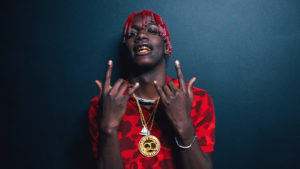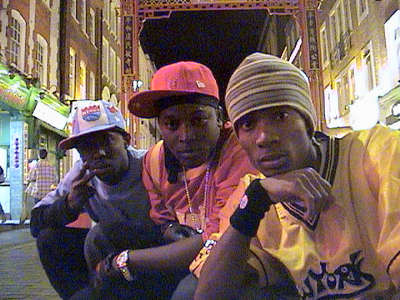In an interview with American music publication, Billboard last year, Lil Yatchy gleefully admitted that he honestly couldn’t name five songs by Tupac and Biggie Smalls. With that statement, the self-anointed ‘king of teens’ positioned himself between the crosshairs of internet trolls, especially from those who believed he was out rightly pissing on hip-hop culture.
Being a major part of ‘mumble rap’ – a sect that many have attributed with the continual death of hip-hop (whatever that is), Yatchy was an easy target and he didn’t make it any easier on himself by calling Biggie overrated in a Pitchfork feature just a few weeks later.

The rage grew and the internet trolls took their ever-ready figurative pitchforks to his throat. The noise was finally quelled down when he admitted to not thinking before making those statements on a Beats One interview with Ebro, bare weeks after his second inflammatory misyarn. After apologizing and explaining his newfound respect for Biggie by checking out his back catalog, he went on to freestyle to Craig Mack’s “Flava In Ya Ear”, a song on which Biggie obliterated the remix.
While it is understandable that the derision faced by Yatchy came as a result of Biggie’s sacred status in the hip-hop hall of fame, one sure thing is that the mishap acts as a stepping stone for him to immerse himself in hip-hop history. What changed between those weeks is Yatchy’s reverence to the history of hip-hop, a culture he is part of and inherently owes an appreciation to its history and his forebears. Reverence that will only be bolstered by the meticulous curation and accessibility of hip-hop history in America.
From its humble beginnings at DJ Kool Herc’s party, every marquee moment in American hip-hop is documented in such way that it is just a click away. With the internet, a young Nigerian guy living in Nigeria can learn that the first hip-hop hit single was “Rapper’s Delight” by Sugarhill Gang and also listen to it. While I can easily spurt out the aforementioned fact among many others, I would be at a loss as to what hip-hop song had such parallel seminal impact in my country of residence.
It is no secret that Nigerian music history isn’t exactly well-curated, of which Nigerian hip-hop history has the worst representation. This is mainly due to large portions of missing and untold stories, and scarceness of forums willing to educate the Nigerian society on the history of its hip-hop culture. Lack of these stories has lead to minimal representation and zero distinction of Nigerian hip-hop in the ‘Afrobeats’ tag slapped on us by the international community.
While many Nigerians have grumbled out loud about the communal tag that hasn’t allowed the world to fully see our musical diversity, I’d say we fed their ignorance by not defining and laying out the multicolored ilk of our musical tapestry. If you don’t define yourself, someone else will based on their perception.
During the 2009 Headies, Nigeria’s seminal hip-hop trio of eLDee The Don, Freestyle and Kaboom, together known as Trybesmen in the late 90s/early 2000s reunited for a performance at the award show. While watching the recap of the performance on TV, I remember my parents singing along to the hook of the songs performed.
For someone like me, who was still using pencils to write in school at the time of their meteoric rise, watching that performance on TV was a moment. While I definitely cannot claim that I fully experienced the glory days of the Trybesmen, I could understand their significance on Nigerian music based on the response from the live audience and that of my parents who were seated beside me.
Understanding the impact swelled into maximum respect after listening to the latest episode of eLDee’s Nigerian American podcast. The 45-minute long episode titled ‘2K Trybe’ details the l.formation and subsequent breakout of Trybesmen. It’s the type of story I didn’t know I wanted to hear, but I was extremely elated to listen to.
Nigerian American hinges on poignant storytelling and eLDee’s refreshing perspective, ‘2K Trybe’ is no different. eLDee narrates the sequence of events with such cinematic poise that keeps the story captivating throughout.
Adding vocal excepts from KB when narrating how they came about the name ‘Trybesmen’, and another vocal excerpt from eLDee’s mum – who should be acknowledged as the mother of Nigerian hip-hop – spiked my intrigue. Another interesting spot was an excerpt of Trybesmen’s first demo, “L.A.G Style” – which is also the title of their first album. Although the demo wasn’t released for public consumption, playing it on the podcast was like being shown a relic while taking a history tour. It was trip, and I went the extra mile by backtracking to their debut project.
Listening to L.A.G Style, Volume 1 is like being transported into the past, with the album acting as the portal to the time machine. The dustiness of the album hits you via the subtle feedback emanating from the records, it feels quite dated but very listenable and enjoyable – the type of album that defines its time. The level of rapping on the album is very high, from shadowboxing dissenting rappers who called the group a sellout due to their futuristic mix of Nigerian slang and sonic tendencies with hip-hop, to tackling social issues and some simply fun records. The writing on L.A.G Style is impeccable and the hooks are still extremely catchy.
In what I might consider a serendipitous event, my introduction to the Nigerian American podcast came via a Loose Talk podcast episode titled ‘The Nigerian Hip-Hop Hall Of Fame’, which came out last month. While Osagie Alonge’s summary of the first episode of Nigerian American sold me into a listen, the crux of ‘The Nigerian Hip-Hop Hall Of Fame’ was a discussion about the important moments and trailblazers in Nigerian hip-hop history, with reverence to the 44th birthday of Hip-hop itself as an artform.
‘The Nigerian Hip-Hop Hall Of Fame’ helped me realized the serious dearth of my knowledge in Nigerian hip-hop history. It was like being a fly on the wall while three stalwarts (Osagz, AOT2 & Steve Dede) who have constantly immersed themselves in the culture debated Nigerian hip-hop in-depth. To say I learnt tonnes from that LT podcast episode wouldn’t be an understatement, and even though I was served huge slices of knowledge, my appetite only got heightened. I am still at the shallow end, but my immersion process has begun. I never thought I’d listen to so much Rooftop MCs, Ruggedman and Freestyle in the space of a month.
While I can admit to being quite uninterested, I can also point out that there was little to no allure in trying to learn about the past of Nigerian music. There was (and still little) no awareness on the need to learn about hip-hop history. This is usually the case with casual listeners, especially the young demographic. Besides, we millennials don’t always have the time nor the patience to dig beyond the first page result of a Google search. You either had to have been alive or be an avid fan to know the history behind Nigerian hip-hop.
Curiosity works in both demand and supply, if the product isn’t readily available, curiosity dwindles. Without listening to ‘2K Trybe’ and ‘The Nigerian Hip-Hop Hall Of Fame’, I doubt if I would be as enthused about Nigerian hip-hop as I am right now. There are hundreds of young impressionable people like me who no doubt will take a special interest in the richness Nigerian hip-hop has to offer if they listen to both podcast episodes or found materials with similar exposure.
These days, Nigerian hip-hop is considered to be in a rough patch. Even with a seemingly deep roster in terms of talent, conditions for rappers to rise into spotlight these days aren’t the least bit conducive. Situations weren’t exactly rosy during the rise of eLDee and the Trybesmen, and they found a way to overcome (shout-out to eLDee’s mum again). Remembering and acknowledging the trials and subsequent triumphs will serve as inspiration to both fans and artists alike to rise above the current narrative, therefore pushing Nigerian hip-hop to greater heights.
The conversation has started on those platforms, it should continue to expand and the dividends will be definitely be huge. If not, the ignorant Lil Yatchy stereotypes will pop up in numbers. When it does, there most likely won’t be any derision, because we didn’t value the history of Nigerian hip-hop enough to document it and keep it alive.


